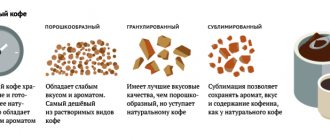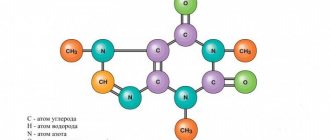Composition of coffee beans
Chemical composition of coffee beans
The product contains more than 2000 nutrients. They are responsible for the beneficial and harmful properties of coffee. Most of it is sugar and fiber, which forms a foam when cooked. Coffee beans are rich in vitamin PP, calcium, iron, phosphorus, copper, potassium. Depending on the variety, the amount of caffeine is 0.65-2.7%. Chlorogenic acid is contained in green coffee beans in large quantities, but during heat treatment it decreases by 2-3 times.
During roasting, biochemical processes occur that lead to a change in the percentage of incoming components. The sugars caramelize, causing the beans to turn brown. Fiber breaks down into amino acids, alcohols, and organic acids. The alkaloid trigonneline releases niacin (vitamin PP). The amount of caffeine remains almost unchanged, but due to loss of moisture its concentration increases.
The grains contain about 30 organic acids, which almost do not change their composition after roasting. The aroma of the product is due to essential oils and caféol. It is still not possible to synthesize these compounds to the full extent to obtain a natural odor.
Green coffee contains up to 9% tannins, while black coffee contains about 1%. These substances give the drink its taste and color. With a strong decrease or increase in their quantity, the taste is greatly reduced.
The effect of coffee on the human body
The effects of the chemical composition of coffee beans are still not fully understood.
Many substances remain a mystery, which is why debates often arise about the health benefits and harms of coffee. Sometimes a product causes opposite reactions in different people. This is due to the influence of these substances in connection with the individual characteristics of the body. Coffee beans affect many organs and systems:
- vessels;
- heart;
- liver;
- nervous system;
- stomach;
- brain;
- joints.
Often, the harm of coffee only manifests itself in cases of personal intolerance and excessive consumption of the drink. The benefits are also individual and depend on the characteristics of the body. For example, for some it increases performance, for others it causes a loss of strength.
What are the benefits of coffee?
The effect on the body depends on the physical characteristics of the person. The benefits of coffee are expressed in improving mental activity, mental and physical performance. The product has a beneficial effect on many organs, is preventive and therapeutic.
Moderate consumption of the drink activates metabolic processes and reduces hunger. Natural coffee without additives before training increases the breakdown of glycogen and promotes fat burning. These properties are used in programs for weight loss and maintaining normal weight.
Beneficial properties of natural coffee:
Preference should be given to natural coffee
- Prevention of gallstone disease.
- Resistance to depression and stress.
- Antioxidant properties.
- Decreased appetite.
- Memory improvement.
- Productivity increase.
- Reducing the likelihood of developing diabetes.
- Reducing the risk of cancer.
- Acceleration of metabolism.
- Improving food absorption.
- Diuretic effect, useful for edema.
- Prevention of gout.
- Reducing the risk of Parkinson's disease.
Natural coffee has more benefits than freeze-dried, instant coffee. The active substances of the grains are destroyed during additional processing. Therefore, when answering the question of whether coffee is good for health, you should consider what kind of product we are talking about.
Why is coffee harmful?
Harm of coffee to the human body:
- Increased blood pressure, which is especially dangerous for hypertensive patients.
- Load on the vascular system.
- Increased heart rate.
- The harm to teeth and bones is due to the fact that calcium is washed out of the body. In addition, tooth enamel darkens, increased acidity provokes the appearance of caries.
- Increased risk of developing joint diseases.
- Dizziness, weakness.
- Sleep disorders.
- The diuretic effect can cause dehydration.
- Increases bad cholesterol levels.
- Excessive consumption of the drink leads to nervousness and irritability.
- The harm of coffee to the skin is manifested by deterioration of color, grayness, dullness, and withering.
- In some cases, loss of strength and apathy may be observed.
- Habituation causes addiction.
- Headache.
- When consumed by a pregnant woman, the active substances reach the baby, which negatively affects its development and can cause a miscarriage.
On a note! Harm to children is expressed in delayed puberty, deterioration of cardiac function, mood swings, and the risk of dehydration.
Is it harmful to drink a lot of coffee?
Most often, the harm is due to the high caffeine content. An overdose of the substance leads to increased blood pressure, intoxication of the body, and deterioration of well-being. But it is not only found in coffee beans. Energy drinks, black and green tea, mate, chocolate, cocoa, Coca-Cola, Pepsi-Cola, and guarana fruits are high in caffeine.
At the same time, if you think about what is more harmful - coffee or energy drink, it is clear that the latter. A drink made from natural, high-quality beans contains several times less caffeine and consists entirely of natural ingredients. Energy drinks are highly carbonated and contain a lot of harmful chemicals and sugars.
If you drink several cups of espresso coffee at once, you will experience the following symptoms:
- cardiopalmus;
- trembling in hands;
- dehydration – dry mucous membranes, dizziness, confusion;
- due to narrowing of the blood vessels in the brain, weakness, sudden fatigue, and fainting may occur;
- possible digestive disorders, expressed by nausea, diarrhea, development of gastritis;
- shallow breathing, lack of air;
- increased sweating.
An overdose of coffee can harm the body
Harm and benefits for women's health
Natural coffee is rich in antioxidants that slow down the aging process. In women over 50 years of age, daily use stimulates sexual activity, but can increase postmenopausal symptoms. If acceptable standards are observed, the benefit is manifested by a preventive effect against breast and uterine cancer, liver cirrhosis, and Parkinson's disease.
The product can not only be consumed internally, but also used externally as a cosmetic product. The benefits of coffee for hair include stimulating hair growth and nourishing the follicles. Coffee wraps have proven themselves in the fight against cellulite, stretch marks, and fat deposits. The benefits of coffee for the face include the use of masks and scrubs based on ground beans, while consumption orally has a negative effect on the condition of the skin.
The harm from coffee is manifested by depletion of the nervous system, which is especially noticeable in women. The leaching of calcium from the body leads to the development of osteoporosis, deterioration of the condition of teeth, nails, and hair. It is important to take into account the development of coffee addiction, which is more difficult for women to cope with than for men.
Has a negative effect on the endocrine system. The adrenal glands produce more cortisol, which reduces progesterone production. Hormonal imbalance prevents conception and negatively affects the bearing of a child during pregnancy. The effect of caffeine on the thyroid gland is controversial. With hyperthyroidism, the body functions under wear and tear, the drink worsens the situation. For hypothyroidism, it will stimulate metabolic processes and improve mood.
Harm and health benefits for men
If you have heart problems, you should significantly reduce the amount of coffee you consume.
Natural coffee is good to drink for bronchial asthma, digestive disorders, and excess weight. It has a preventive effect by reducing the likelihood of developing cardiovascular pathologies, diabetes, and liver cancer. With moderate consumption, the amount of energy produced increases, the functioning of the senses becomes more acute, and new information is more easily absorbed.
The benefits only appear when consumed by a healthy person. Many men over 35 suffer from heart problems. In this situation, increased heart rate and stress on the heart muscle can be dangerous. Dehydration creates additional stress on blood vessels.
The benefits and harms of coffee for joints are determined by the amount of drink consumed and the individual characteristics of the body. More than 3 cups a day can cause various diseases. Joint pain after physical activity and exercise may be relieved by drinking the drink. Regular consumption reduces the risk of developing gout.
Natural coffee acts as an aphrodisiac and stimulant, which increases potency. But abuse leads to the opposite effect by reducing testosterone. Some substances in coffee beans act like the female hormone estrogen. Its excess in the male body leads to enlargement of the mammary glands.
You also need to know what other harm coffee can cause to a man. For example, it affects the number of active sperm in semen. Thus, there is a negative effect on reproductive function and the ability to conceive. This is especially pronounced in young men.
Who is it harmful to?
This tasty drink has many side effects and is not recommended for entire categories of people.
If the expectant mother has joint diseases, coffee is definitely contraindicated
For women
It has a negative effect on the female body in the following cases:
- During pregnancy. Coffee leaches calcium from the body, and a lack of this element can harm the formation of a child’s bones. It also leads to fluid retention in the tissues, which can cause swelling.
- During menopause, because caffeine increases menopausal symptoms.
- For endometriosis and uterine tone, as it has a stimulating effect on the mucous membrane.
- During menstruation. Due to its property of retaining water in the body, pain in the lower abdomen may appear.
- After embryo transfer, instant coffee is contraindicated, but one cup of natural coffee is allowed at low blood pressure.
This is important: caffeine in excessive doses reduces the chance of conception by 25-40%!
To old people
Harmful to older people. With age, bones become more fragile, diseases of the joint system begin (arthritis, arthrosis), and coffee has a detrimental effect on joints and bones, which further increases the risk of fractures.
Smoking
Particularly dangerous for smokers. Smoking nicotine constricts blood vessels, which puts enormous strain on the heart. Caffeine has the same effect, so the smoker gets a double whammy to the cardiovascular system. Simultaneous consumption of coffee and cigarettes increases cholesterol levels and has a negative effect on the stomach and nervous system.
When losing weight, on diets
A cup of latte has the same calorie content as a slice of cake.
Does coffee affect your figure? A cup of natural brewed coffee without sugar contains only 2 kcal. But if you drink it with milk, the calories increase depending on the volume of the dairy product. If you add sugar, then such coffee will undoubtedly harm your figure. A cup of latte can equal the calories of a piece of cake, so such a delicious drink will help you gain weight and is not suitable for those losing weight.
Effect of caffeine
Caffeine is found in many drinks.
The alkaloid stimulates mental and physical activity, tones, increases the secretion of gastric juice, and enhances intestinal motility. The effects of caffeine on the cardiovascular system are twofold. The substance stimulates heart contractions, but at the same time, activates the center of the vagus nerve, which inhibits the work of the heart.
Caffeine is useful for hypotensive people and helps restore blood pressure to normal levels. By increasing vascular tone, it can have an analgesic effect during migraines. For this reason, it is often included in medications for headaches, as well as for depression of the central nervous system, cardiovascular and respiratory systems, brain spasms, drowsiness, enuresis in children, etc.
Coffee addiction
With regular, long-term consumption of coffee in large quantities, caffeine dependence can develop. Symptoms of the condition with a sharp decrease in caffeine dose:
- loss of energy;
- drowsiness;
- headache;
- nausea;
- chills;
- muscle pain;
- constipation;
- sudden change of mood.
On a note! These manifestations appear 12 hours after the last dose. Symptoms may persist for up to 9 days.
You can suspect a caffeine addiction based on the following signs:
- Any money for one small cup.
- Not a single morning is complete without your favorite drink.
- The smell of coffee leads to a state of euphoria, inexplicable happiness.
- With one sip you can tell which product is caffeine-free.
- Arguments about harm cause laughter.
The condition develops gradually. Over time, you realize that you need more and more drink to perk you up. At the same time, the stimulating effect is not enough for a long period of time. After a few hours, the active state is replaced by a depressed one, and the body’s reactions slow down. In order to correct the situation, the person drinks a cup again. So the dose gradually increases, addiction occurs, smoothly flowing into a state of dependence.
Coffee can be addictive
Is it harmful to drink coffee every day?
Daily consumption of the drink is acceptable in small doses and in the absence of symptoms of caffeine addiction. A contraindication to daily use may be individual reactions of the body, when even 1 cup causes side effects. In other cases, a small amount, especially without added sugar, will only be beneficial. But it is also harmful to drink a lot of coffee on a regular basis, when the risk of adverse reactions increases.
Is it allowed to be used for illnesses?
For psoriasis, coffee is on the list of prohibited foods.
Strictly prohibited
Diseases of the gastrointestinal tract, such as gastritis, stomach ulcers, pancreatitis, as this drink contains substances that increase acidity. It will also have a negative effect in cases of dysbacteriosis, poisoning, and bloating. Diseases of the cardiovascular system. Caffeine constricts blood vessels, increases blood pressure, increases the heart rate, so you should avoid it with hypertension, arrhythmia, tachycardia, aortic stenosis, after a stroke and myocardial infarction, with atherosclerosis of cerebral vessels, varicose veins. Anemia because coffee interferes with the absorption of iron. Mastopathy. Due to the properties of the drink to cause a rush of blood, the mammary gland swells, which intensifies the disease. Uterine fibroids. Excess accumulated fluid in the body from drinking coffee can cause fibroid swelling. Coffee inhibits the activity of the thyroid gland and is therefore contraindicated in patients with hyperthyroidism. Urolithiasis, cystitis, pyelonephritis, thrush. When drinking coffee, the content of calcium and magnesium in the urine increases, which leads to the formation of stones. Allergies, psoriasis. This is especially true for instant drinks, because they may contain additives and flavorings that cause allergic reactions. According to recent studies, coffee reduces the risk of gout and has a beneficial effect on the liver. Surprisingly, if you already have these diseases, then you are not allowed to drink this drink. For liver diseases, cirrhosis, hepatitis C, and fatty liver, it is recommended to avoid strong drinks, including coffee, especially instant coffee. Large amounts of caffeine aggravate gout.
Limited use
Scientists have differing opinions regarding drinking coffee with high sugar levels and diabetes mellitus. The natural brewed drink itself does not increase blood sugar, but it is clear that if you have diabetes (especially type 2), you should not drink coffee with sugar, cream and other additives. If you have high cholesterol, you should consult your doctor about drinking the drink. When cooked, it produces a substance called cafestol, which increases cholesterol. Therefore, with this disease, you can only drink coffee brewed with a filter. For many years, coffee was considered harmful for cancer. However, recently scientists have been talking about its benefits in oncology. It contains a large amount of antioxidants that destroy cancer cells. Of course, we are talking about a natural drink prepared at home. And yet, with such a serious disease as cancer, you need to create your diet on the advice of a doctor. You should not drink a lot of coffee if you have epilepsy, as it excites the nervous system. Excessive caffeine consumption harms vision, can cause glaucoma, and reduces blood flow to the eyes. Therefore, in case of visual impairment, as well as for the prevention of myopia, you should not exceed the daily norm - no more than 3 cups.
The correct coffee cup size is 100 ml
You should know this! A coffee cup is not the mug in which we drink tea. The volume of a coffee cup is from 80 to 120 ml, while a tea cup is from 250 to 300 ml. When we recommend drinking no more than 3 cups of coffee a day, we mean coffee cups!
Conditionally useful
For colds such as ARVI, sore throat, cough, sore throat, you can take it as usual. Coffee may even be beneficial because it contains antiviral substances. But at elevated temperatures you should avoid drinking the drink - it increases your heart rate, which is already faster during a cold. Coffee is a good remedy for depression, as it contains serotonin, the hormone of happiness. The drink can relieve migraine symptoms. For multiple sclerosis, a good cup of coffee will be useful, but there is no need to overstimulate the nervous system with too much. Coffee can thin the blood, so it can be taken when the blood is thick, but without abuse.
Instant coffee – harm or benefit?
There are two varieties - regular soluble and freeze-dried. The latter differs in the method of preparing coffee powder, due to which some of the beneficial substances of natural beans are retained, but the price is higher. If you are wondering which of these coffees is healthier, then of course freeze-dried coffee. But compared to natural ones, both types are much inferior in terms of the amount of useful components they contain.
The caffeine content in instant drinks is lower, but chemical ingredients are added that have a negative effect on the body. Flavor and aroma enhancers, dyes, and stabilizers added to low-quality products are seriously harmful to health. Even expensive instant coffee may contain additional components or be counterfeit. Therefore, if there is a choice between a natural and soluble product, it is better to prefer the first option, which has undoubted benefits, and not just side effects.
Is capsule coffee harmful?
Using capsules significantly reduces preparation time.
The product they contain does not lose its taste and aroma for a long time. The harm of the capsule variety of the drink is often attributed to the packaging, i.e., the materials from which the capsules are made. High-quality polymers are expensive; aluminum and other substances are used to reduce the cost. Even if the container is made entirely of this metal, it is covered with a protective film that does not allow the contents to come into contact with it. The fact that causes controversy is whether its ions pass into the drink when prepared in a coffee machine? To avoid the negative effects of aluminum on the body, you should use capsules without it in the package. The coffee itself is natural, often a mixture of several varieties. The properties are no different from grain, the benefits remain. All kinds of additives used to prepare varieties of coffee drink can cause harm. Manufacturers do not disclose the secret composition; on the packaging you can often find the inscription 100% Arabica, even in products with the taste of caramel, fruit, spices, milk and other additives. This only indicates the variety, but does not exclude the presence of flavorings, flavor enhancers, stabilizers and other substances.
The cappuccino coffee capsule contains milk powder. Speaking about the benefits and harms, this component should also be considered. On the one hand, milk reduces the harmful effects of caffeine, but on the other hand, using a powder supplement can be harmful. Another capsule variety - latte coffee - contains 2 times more milk. This should be taken into account when choosing a drink.
Which coffee is more harmful: natural, instant, in capsules?
The effect of coffee on the body is ambiguous. On the one hand, it is an invigorating drink that can give a boost of energy in the morning. It increases concentration and performance, reduces drowsiness. On the other hand, it puts a strain on the cardiovascular system; excessive consumption of the drink can cause serious harm to health. For some diseases, its use is undesirable or completely contraindicated. Which coffee should you choose to avoid harm and get not only taste, but also benefits?
When choosing coffee between natural, capsule or instant, give preference to the most natural - that is, natural.
The natural drink is not subjected to any processing other than roasting the beans. Consequently, it retains all its beneficial properties and, if consumed correctly, will provide health benefits. It will be harmful only in the case of diseases for which coffee is generally contraindicated.
Natural coffee beans are the healthiest
Capsule coffee is a portion of ground and pressed coffee, packaged in a special container - a capsule. A capsule coffee machine is used to prepare it. If the capsule is made of a safe material (food grade polymer) and contains high-quality real coffee, then such a drink is equivalent to natural coffee. But if you are not a fine connoisseur and connoisseur of coffee capsules, you may end up with a low-quality product that is hazardous to your health. Cheaper varieties are packaged in aluminum, which, when accumulated in the body, paralyzes the cells of the central nervous system. The capsule may contain flavorings, additives that affect taste, and milk powder. Unfortunately, it is impossible to check this - the composition is not indicated on the packaging.
Instant and freeze-dried coffee can hardly be called a natural product. It is made from low grade grains. It usually contains flavorings and dyes. During the cooking process, it is boiled and dried, which greatly reduces its beneficial properties.
This is interesting. What to replace coffee with? Many believe that decaffeinated coffee is less harmful to health. In fact, it contains dangerous substances and additives, but does not provide the same benefits as a real drink. If you need to give up caffeine, chicory is a good substitute. This natural drink tastes like coffee and is not addictive. But you need to keep in mind that chicory also has certain contraindications.
The Chicory drink is obtained from this beautiful plant.
Traditionally, it is believed that coffee is much more harmful than tea. If we are talking about a healthy person, then it is not entirely correct to compare these drinks. They meet different needs of the body and need to be consumed in different ways. It is advisable to drink coffee in small quantities (one mug per day) as a natural energy drink. Black and green teas are more everyday drinks. You can drink several cups of tea a day without harm to your health.
Green coffee
The product differs in taste and smell from traditional black. Beans that have not been roasted have a sour, grassy taste, which greatly reduces the taste. This variety is often used in weight loss and healthy eating programs.
What are the benefits of green coffee:
- The caffeine content is lower, which reduces its harmful effects on the body.
- Many antioxidants that prevent aging and reduce the risk of cancer.
- There is 2 times more tannin in unroasted grains. This substance narrows blood vessels and strengthens their walls. It has an antiseptic effect and increases blood clotting.
- The high content of chlorogenic acid reduces the absorption of carbohydrates into the blood and inhibits the formation of subcutaneous fat, which is used for weight loss.
- The use of green grains in cosmetology is widespread. They are also used in the form of oil, which helps cope with stretch marks and cellulite, improves hair structure, moisturizes the skin, and prevents the appearance of wrinkles.
The harm from green coffee is the same as from black coffee. Abuse can lead to stomach upset, insomnia, and irritability. Roasted grains have a less detrimental effect on the gastrointestinal tract and cause fewer ailments.
When can you drink coffee and when not?
The combination of coffee and cognac also cannot be called useful: a colossal load on the heart and blood vessels, insomnia or restless sleep - wow, this is a “medicine”!
Combinations dangerous to the body
- It is strictly forbidden to drink this drink after alcohol. This will place an undue burden on the heart of even a healthy person.
- It is contraindicated to take tablets with coffee, as well as with other drinks other than water.
- Under no circumstances should you take antibiotics with coffee. In such a mixture they can give an unpredictable effect.
- Taking aspirin with coffee has a detrimental effect on the stomach, since both drugs increase acidity.
- Diclofenac can cause stomach ulcers and increases blood pressure, so taking it with coffee is contraindicated.
Tests and treatment
- On the day of an ultrasound, gastroscopy, donating blood for tests, including hCG (human chorionic gonadotropin) - a blood test for pregnancy, you should avoid coffee so that the studies are accurate.
- Men should remember that they should not abuse this drink a week before taking a spermogram, otherwise the volume of seminal fluid and sperm motility will decrease.
- After removal of the gallbladder, appendicitis and other operations, you should abstain from coffee. Increased blood pressure and an accelerated heart rate can cause complications after surgery.
- It's no secret that coffee stains teeth yellow. Therefore, there is no need to use it after tooth extraction and especially after installing a light filling. When wearing braces, it is difficult to remove dental plaque efficiently, so it is better to refuse the drink.
Sports, training and the use of sports supplements
It is not advisable to drink coffee before cardio training.
- Eleutherococcus is an energy booster, stimulates the nervous system, enhances the effect of caffeine, so combining it with coffee is not recommended.
- You can take coffee while on a creatine course. The main thing is to separate these doses in time so that creatine is better absorbed.
- Many athletes use caffeine as a pre-workout energy drink. Drinking coffee half an hour before training in the gym is not contraindicated; it is better if it is strength training rather than cardio. For bodybuilders, caffeine is interesting because it increases testosterone levels, which helps gain muscle mass. After training, the cardiovascular system is in an excited state, so it is better not to drink the drink.
Healthy lifestyle and proper nutrition
- It’s good to drink a cup of invigorating coffee in the morning, but you definitely shouldn’t drink it in the evening or at night - it will prevent you from falling asleep.
This is important: coffee stimulates the digestive system, so you should not drink it in the morning on an empty stomach or on an empty stomach. To prevent the pancreas and stomach from working idle, drink coffee after meals. Otherwise, you can get diseases such as pancreatitis and gastritis.
- The intake of fruit and coffee should be separated. Firstly, both products have a laxative effect. Secondly, coffee, like any liquid, washes out gastric juice, which makes nutrients and vitamins from food less absorbed.
- Can you drink coffee while eating healthy? Proper nutrition implies only natural products, so you should not refuse a cup of high-quality brewed drink in the morning. Soluble is not suitable in this case.
- In a practice such as a raw food diet, coffee is unacceptable, since heat-treated foods are not consumed.
- To keep your teeth white, do not drink coffee after brushing them.
So to drink or not to drink coffee? For certain diseases, you need to wean yourself off this product, and for healthy people it is better to opt for a natural drink and not exceed the permissible limit in order to benefit and not harm yourself.
Decaf Coffee: Pros and Cons
Does this drink have any benefits? It would seem that the content of harmful alkaloid is much less, which means that the harm to the body should be significantly reduced. But in reality everything turns out to be somewhat different. Various chemical solvents are used to remove this substance from coffee beans. Some of them remain in the product and do not affect the body in the most beneficial way. The second disadvantage is the deterioration of taste and aroma. To correct the situation, manufacturers add various synthetic components.
Useful qualities include:
- Does not cause caffeine addiction.
- Does not have other side effects of caffeine.
- Reduces blood pressure.
On a note! When drinking a drink, the amount of fatty acids increases in the same way as when eating fast food.
What do side effects mean after consumption?
Don’t guess with coins and especially with coffee grounds; it’s better to use the list of contraindications
Headache, heartache
A headache means your blood pressure is likely high. If pain in the stomach, kidneys, heart, liver, or chest is added to the symptoms, then an overdose has occurred. This can happen if you drink a large amount of coffee in a short time.
If coffee gives you a headache, you may have high blood pressure
Yellow coating on the tongue
A yellow coating on the tongue indicates diseases of the internal organs - the gastrointestinal tract, gall bladder, liver.
Heartburn
Heartburn indicates possible stomach problems.
Nausea
Nausea can also occur with stomach diseases, as the drink irritates the mucous membrane. If you feel sick even from the smell, this indicates an allergy, severe nervous fatigue, stress, or hidden diseases. In such a situation, it is better to consult a doctor and undergo an examination.
Upset stomach, abdominal pain, diarrhea
Symptoms such as gas formation, stomach turmoil, and indigestion (especially caused by coffee with milk) are explained by the fact that the drink has a laxative effect. If you constantly feel bloated and need to go to the toilet after drinking coffee, stop drinking and monitor your well-being during the withdrawal period.
Pimples
Acne breaks out due to the fact that coffee increases the oiliness of the skin.
Stains on teeth
Yellow tongue and teeth?
You obviously overdid it with coffee. Staining appears on your teeth. This can happen due to the coloring properties of coffee when consumed in excess. For prevention, you need to brush your teeth immediately after drinking the drink.
Layering of nails
If your nails peel, this indicates insufficient calcium in the body, because coffee washes it away.
Drowsiness, inappropriate behavior, hallucinations
If the drink makes you sleepy instead of alert, or even causes hallucinations and panic attacks, this means a severe overdose. You need to immediately stop using it for a while. You should return to it slowly in small doses.
How to drink coffee without harm to your health?
Following several rules will significantly reduce the negative impact:
- Choose a natural, high-quality product that brings benefits along with pleasure.
- Do not drink on an empty stomach; it is advisable to drink the first cup no earlier than an hour after breakfast.
- Do not exceed the permissible daily dosage.
- Don't add sugar.
- Maintain a drinking regime, increasing the usual volume of water when drinking coffee. For every 1 cup of coffee, you should drink 2 additional volumes of water.
- Do not use if there are contraindications or side effects.
- In a stressful situation, weakness or lack of sleep, the number of cups should be reduced. The body is weakened and reacts more strongly to stimulants.
How much coffee can you drink without harm to your health?
The maximum permissible amount per day depends on the individual characteristics of the body, weight, lifestyle, and health status. For a healthy adult, the optimal amount is 1-3 coffee cups (100 ml) per day. The maximum permissible caffeine intake is 400 mg. This is approximately 8 cups of espresso or 4 200 ml servings of Turkish coffee.
On a note! Smokers need to drink less coffee. Nicotine constricts blood vessels, just like caffeine. This results in a double load on the heart.
Coffee should not be drunk if a person is completely healthy
Even if there are no health problems, coffee may not be suitable for everyone. Some people begin to feel unwell after drinking this drink.
Pregnancy
Caffeine can even have an effect on the fetus in the womb, which is not good. If you drink more than three cups of the most popular invigorating drink a day, there is a risk of miscarriage, as well as premature birth, and even the child may have a low birth weight because of this. Therefore, it is better to simply exclude coffee from your diet.
Nursing mothers
Caffeine easily passes into breast milk, which the baby feeds. Thus, his excitability may increase, sleep may be disturbed, and the baby becomes anxious and irritable. And caffeine is removed from the child’s body for four whole days. So you should think a hundred times whether you should drink an invigorating drink while breastfeeding.
Age
It is important to know that after 50 years of age, calcium in the bones becomes noticeably less. It must be said that caffeine interferes with the normal absorption of this essential mineral. The drink becomes especially prohibited if osteoporosis is diagnosed.
Smokers
Nicotine and caffeine significantly increase blood pressure. In other words, it is better for smokers not to drink the invigorating drink at all. And if you really don’t want to give up coffee, then you should smoke and drink it at least at different times.
Contraindications for drinking coffee
There are a number of contraindications to drinking coffee.
Most of the contraindications relate to the abuse of the drink. But there are also absolute ones, in which even minimal use of the product is prohibited.
Drinking coffee is harmful if:
- cardiovascular disorders;
- increased stomach acidity;
- gastrointestinal diseases;
- anemia;
- mastopathy;
- kidney and liver diseases;
- hyperthyroidism;
- increased nervous excitability;
- decreased vision;
- tendency to allergic reactions;
- planning a child;
- pregnancy;
- breastfeeding;
- in childhood and old age.
So what is more in coffee - good or bad?
The answer to this question is purely individual. The same drink affects people differently. We can talk about benefits only in case of complete health; in case of any ailments and diseases, harmful properties are more pronounced. For example, a natural product is considered preventive against gout and cirrhosis of the liver, but use is prohibited in the presence of these diseases.
It should also be remembered that the invigorating effect of natural coffee appears only in the first hours, then a sharp decrease in performance occurs. This is especially pronounced in the presence of caffeine addiction. Soluble does the opposite. In a state of severe sleep deprivation, drinking it is contraindicated, especially while driving.
The benefits and harms of the drink depend on the naturalness and quality of the raw materials for its preparation. Only natural bean coffee has beneficial properties. Soluble and decaffeinated ones can cause more harm. Capsules should be chosen with caution due to possible additives and poor quality packaging. It is also undesirable to overuse green.











